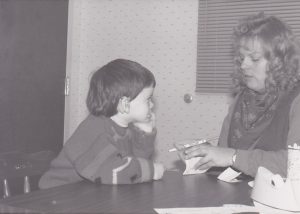Ten minutes before walking out the door for our first date, my now-husband sent me the following text: “I just wanted to let you know…I’m hearing impaired. I wear a cochlear implant and speak and hear pretty well, but I didn’t want you to be surprised.”
It’s fair to say that most everyone feels a little anxious before going on a first date. But reading this message definitely sent my nerves into overdrive. Luckily, I’d taken a few adaptive and assistive technology courses in college, so I was not new to the words “cochlear implant.” I quickly scanned my memory for important bits of information but the details were muddled by anxiety. For some silly reason, all I could think about was that I didn’t want to order anything for dinner that would be messy or difficult to eat. If my date was potentially going to be reading my lips all night, the last thing I needed was to get something stuck in my teeth (insert facepalm emoji).
Fast forward 10 years and that night is still cemented in my brain. The four-hour date marked the beginning of our beautiful relationship, but it was also the start of my crash course in what it looks like to love someone with a profound hearing impairment.
March 3rd is World Hearing Day, a time to celebrate the gift of sound and promote hearing care for all. I’ve learned a lot, through the years, about the unique challenges and beauty that come from a piece of technology, like the cochlear implant. For something so small, it has a significant and sometimes surprising impact on our family. But we are all incredibly thankful for the hearing ability in which it provides.
My husband was born deaf and received his first set of hearing aids at the age of 6 months. While they amplified volume, the aids did very little for sound clarity. So, at the age of 12, he underwent surgery for a cochlear implant or CI. (It should be noted that the decision to receive a CI is incredibly personal. The deaf community is diverse, and what suits one individual might not work best for someone else. The cultural differences run deep…a topic I will save for another day.)
he underwent surgery for a cochlear implant or CI. (It should be noted that the decision to receive a CI is incredibly personal. The deaf community is diverse, and what suits one individual might not work best for someone else. The cultural differences run deep…a topic I will save for another day.)
Please understand, receiving a cochlear implant is not an instant fix for deafness. Don’t get me wrong, it can drastically improve a person’s hearing, but it takes years of auditory verbal therapy and numerous mapping sessions with an audiologist to reach the ideal settings and device performance. Science is a beautiful, but often complex thing.
With his implant, my husband can now identify the voices of his loved ones. He can make out inflection and expression and can participate in organized conversation. (Becoming a parent and understanding toddler lingo was a bit challenging, but I think a majority of people with perfect hearing would say the same thing.) He can communicate over the phone, something he was not able to do with hearing aids, and the added sound clarity has drastically improved his speech. He no longer drops word endings or uses “slushy” articulation, but instead, has steady control over his own voice.
My husband’s favorite CI feature is that he can share universal audio experiences, like listening to music or following the verbal instructions of a sporting coach. Our house is full of sport and song…two things that continue to amaze and surprise me.
Over the years, my husband’s hearing impairment has connected him to some incredible individuals and organizations. He’s worked with dozens of speech-language pathologists (SLPs) and audiologists, including a SLP who was a pioneer in auditory-verbal therapy. Associations like Hear Indiana and AG Bell have introduced him to friends all across the state and country. Each person and group have played a formative role in my husband’s life.
This March 3rd, I’d encourage you to learn a little more about these amazing resources. Use World Hearing Day as a time to reflect on and celebrate the beautiful gift of sound.








